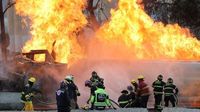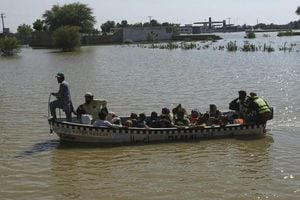On the morning of September 10, 2025, the bustling cityscape of Mexico City was shattered by a catastrophic explosion that left a trail of devastation, heartbreak, and urgent questions about public safety. A gas tanker truck, loaded with more than 13,000 gallons (49,500 liters) of liquid propane, crashed and exploded on a major highway in the densely populated Iztapalapa district in the east of the capital. The blast engulfed over two dozen vehicles in flames, killing at least eight people and injuring 90 others, including a baby and a 2-year-old child, according to The Associated Press and statements from Mexico City officials.
The aftermath was harrowing. Survivors staggered from the inferno, their clothing in tatters, many suffering from second- and third-degree burns. Some victims had burns covering their entire bodies. Photographs and videos circulating online showed flames mushrooming from the toppled tanker, sending thick black smoke billowing over the south of the city. The scene was chaotic: people screaming, running for their lives, and neighbors risking their own safety to pull burn victims from the fire and get them to safety.
Mexico City Mayor Clara Brugada, who visited the site, described the incident bluntly: “This is a horrible accident.” She confirmed the death toll had risen to eight by Thursday, September 11, with 67 people still hospitalized and 22 of them in critical condition. Among those in grave condition were the truck’s driver and children as young as two. “People were sobbing, screaming, fleeing,” recalled Pilar Domínguez, a local resident who witnessed the explosion while driving with her daughter. She later helped distribute sweet bread and coffee to families waiting outside hospitals, saying, “It’s a way to help, and also give thanks that we’re still alive.”
The explosion occurred under a highway overpass—one of the city’s busiest arteries, leading toward Puebla—creating a traffic nightmare and prompting an immediate emergency response. Firefighters battled the blaze with hoses and foam, eventually bringing the flames under control by evening. The roadway was reopened later that day, but the scars—both physical and emotional—remained for those affected.
As the smoke cleared, attention quickly turned to the cause of the disaster and the broader risks posed by Mexico’s heavy reliance on trucked liquid propane. Regulators and prosecutors launched an inquiry, focusing on the tanker’s compliance with safety and insurance regulations. The truck bore the logo of Silza, a prominent energy transport company. However, when contacted by The Associated Press, a Silza official initially denied that the vehicle belonged to the company. Later, Silza issued a statement claiming it held three current insurance policies to cover damages and was taking steps to support affected families.
Contradicting Silza’s assurances, Mexico’s environmental ministry and the federal agency responsible for industrial safety in the hydrocarbon sector stated that Silza did not have the updated insurance paperwork required to transport gas. According to the agency, Silza’s application for insurance approval had been rejected, raising serious questions about regulatory oversight and corporate accountability. The company did not immediately respond to further requests for comment.
This tragic incident has reignited concerns about the thousands of trucks that rumble daily through Mexico City, transporting liquid propane—a fuel most homes and businesses depend on for cooking and heating water. The sheer volume of hazardous material moving through densely populated areas has long been a source of anxiety for residents and officials alike. “We’re incredibly worried. We have no idea what’s going to happen,” said Rafael López, who waited anxiously outside a hospital for news about his injured cousin.
President Claudia Sheinbaum expressed her condolences to the families of those killed and thanked emergency teams for their swift response. She also announced that she had instructed her energy secretary to design new measures to make the transportation of fuel safer, though she did not provide details about what those measures might entail. The president’s statement underscored the urgency of addressing systemic vulnerabilities before another tragedy occurs.
The horror of the explosion brought neighbors together in solidarity. Outside hospitals, volunteers handed out food and water to families waiting for updates on their loved ones. Domínguez, who lives near the crash site, shared her experience of fleeing the flames with her daughter and later breaking down in tears at home. “It sent chills down my spine as my car filled with the smell of smoke,” she said. Her story echoed those of many others who witnessed the devastation firsthand.
This was not the first time Mexico has faced such a disaster. In 2020, a double tanker carrying liquid propane flipped on a highway in the western state of Nayarit, killing 13 people when a fire spread to other vehicles. Five years earlier, a leak from a smaller propane truck delivering gas to a Mexico City maternity hospital caused a massive explosion, killing five and injuring dozens. Each incident has prompted calls for tighter safety standards, but enforcement and oversight have often lagged behind the scale of the risk.
The September 2025 explosion has brought these issues back into sharp focus, with families and officials alike demanding answers. Prosecutors continue to investigate the exact sequence of events, but early indications suggest the truck exploded after tipping over on the highway. The severity of the injuries—some victims with burns over 100% of their bodies—has shocked even seasoned first responders.
For the families of the victims, the waiting game is agonizing. “We have no idea what’s going to happen,” López repeated, capturing the uncertainty that hangs over so many. The resilience of the community, however, has been evident in the outpouring of support and the willingness of neighbors to help, even in the darkest of times.
As Mexico City mourns its dead and cares for its wounded, the city’s leaders face a pivotal moment. The tragedy on the Iztapalapa highway is a stark reminder of the dangers lurking in the everyday movement of hazardous materials through urban centers. Whether new safety measures will be enough to prevent future disasters remains to be seen, but the need for action is clearer than ever.
With investigations ongoing and families still awaiting word on their loved ones, the city’s collective hope is that the lessons from this horrific accident will translate into meaningful change—ensuring that such a tragedy is never repeated.




